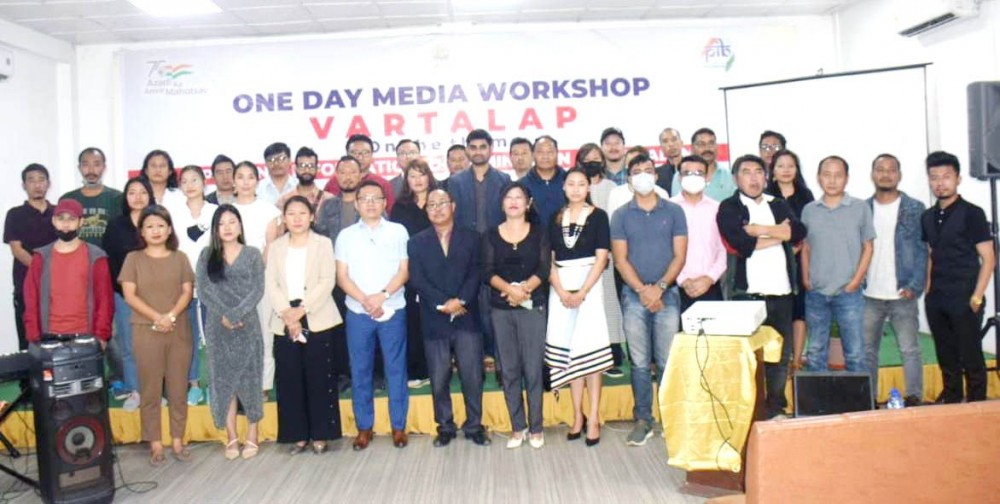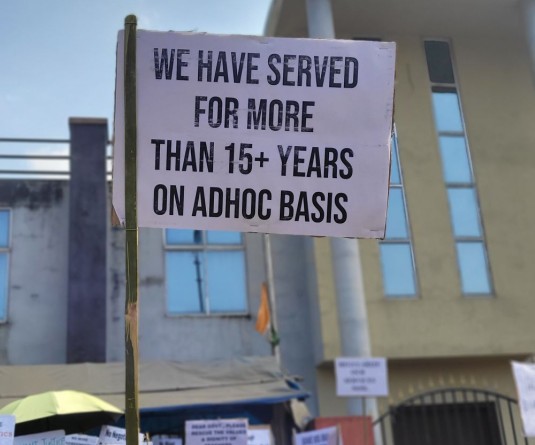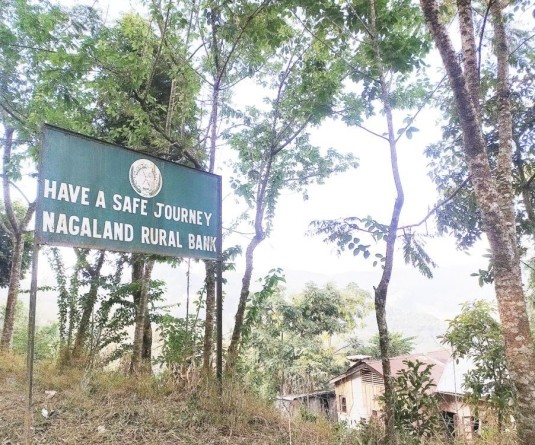Dimapur based media persons with the resource persons and organizers during the one day workshop VARTALAP, at Hotel Saramati Dimapur on March 7. (DIPR Photo)

PIB organises one-day workshop for journalists in Dimapur
Morung Express News
Dimapur | March 7
There are multiple welfare and development-oriented government programmes. Not all are however aware that such programme exists and why it is being implemented. As part of an ongoing initiative to ramp up awareness, the Press Information Bureau, Ministry of Information & Broadcasting, organised a workshop (Vartalap), under the theme: Improving information dissemination in Nagaland, for media persons in Dimapur on March 7.
In essence, the objective of the initiative is engaging state government departments, involved in implementing Central Sector Schemes, with journalists in tow to further the target of information dissemination.
The workshop today had State Nodal Officer, Integrated Disease Surveillance Programme, Department of Health and Family Welfare, Dr Nyanthung Kikon as special guest, who also was one of three resource persons. The President of the Dimapur Press Club (DPC) Temjenrenba Anichar and General Secretary, P Among Aier were in attendance as guests of honour.
Dr Kikon, who has been in the thick of things since the COVID-19 alarm was sounded, recalled the challenges under which professionals like him has been working. He noted what he termed a growing sense of “news fatigue” and distrust, as far as information with regard to the corona virus was concerned. According to him, the distrust arose from unverified information and commentaries. He said that over and above vaccine hesitance, there is a vaccine resistance which has even led to threats to the health workers. It led to what he termed as a “wall” separating the public from the government agencies, which eventually went on to impact response measures, and affecting morale of the frontline workers.
As opposed to views to the contrary, he maintained that the vaccine has been effective in reducing spread and mortality. He pointed to data indicating that people, who got both the doses, were far less likely to get hospitalized and less that 1 percent of such people has contributed to the mortality figures. He added that the death toll in the first was 84 and 633 in the second. It fell to 32 in the third wave, pointing to vaccine efficacy, he said.
Sharing on the topic, ‘Improving Information Flow from Implementing Agencies of Government Welfare Schemes to DIPR, Independent Media & Public,’ DPRO Dimapur called for coordinated communication between the concerned entities.
To this end, the District Public Relation Officer (DPRO) stressed on the importance of effective, integrated and coordinated communication between the implementing agencies and the different media houses in educating the people on the various government welfare schemes implemented in the State.
Most of the common people are not aware of such welfare schemes and through these actions, the targeted beneficiaries avail the benefits meant for them, she added.
The present workshop by the PIB is a good start and the process must be continued by bringing in more implementing agencies, she suggested.
Patton also called upon the media to analyze the implementation of various schemes at the ground level.
Besides, the implementing agencies also need to update about ongoing schemes through regular press conferences, websites and other media platforms, she suggested.
The independent media must also use the power of constructive journalism to bring about changes in governance and citizen’s welfare, she stated, while adding that journalists also need to update themselves on the subject matter to raise relevant questions.
Speaking on ‘NSDMA Role in Prevention & Responding to Disaster in Nagaland,’ the Authority’s Assistant Manager Khrolou Koza Lohe highlighted various activities the NSDMA has had been doing towards enabling efficient and effective responses to the disaster in the State since 2011.
In doing so, she informed on the gradual transformation of the Nagaland State Disaster Management Authorities (NSDMA) into a most effective agency for a holistic and integrated approach to disaster management.
Actual interventions as well as capacity building and awareness campaigns were also highlighted by Lohe during her presentation.
She also informed that the agency is currently executing the ‘Aapda Mitra, a scheme for training of community volunteers in disaster response and is soon scheduled to undertake such training in 7 districts.
The NSDMA is also in the process of creating the concept of ‘Resilient Village’ for disaster management, which among others, is aimed at watching out for different risks, responding to the needs as well as building capacity and awareness on ecological restoration, Lohe elaborated. The NSDMA is collaborating with Sphere India for the campaign.
The ultimate aim is to ‘create a culture of preparedness or prevention, as against culture of reaction,’ the Assistant Manager underscored.
Sharing from field experiences, she however, implied that sometimes, people seem to be more interested in getting immediate relief measures, instead of getting free skills or training on disaster management.
Efficient and effective responses to the disaster especially in the rural areas were discussed and easy accesses of information from the NSDMA officials in the event of disaster were also deliberated after her presentation.
One key take away from Monday’s ‘Conversations’ was to bridge the ‘Wall’ that restricts free flow of information among various stakeholders, particularly between the media and the implementing agencies, to enable transparent and accountable governance.





